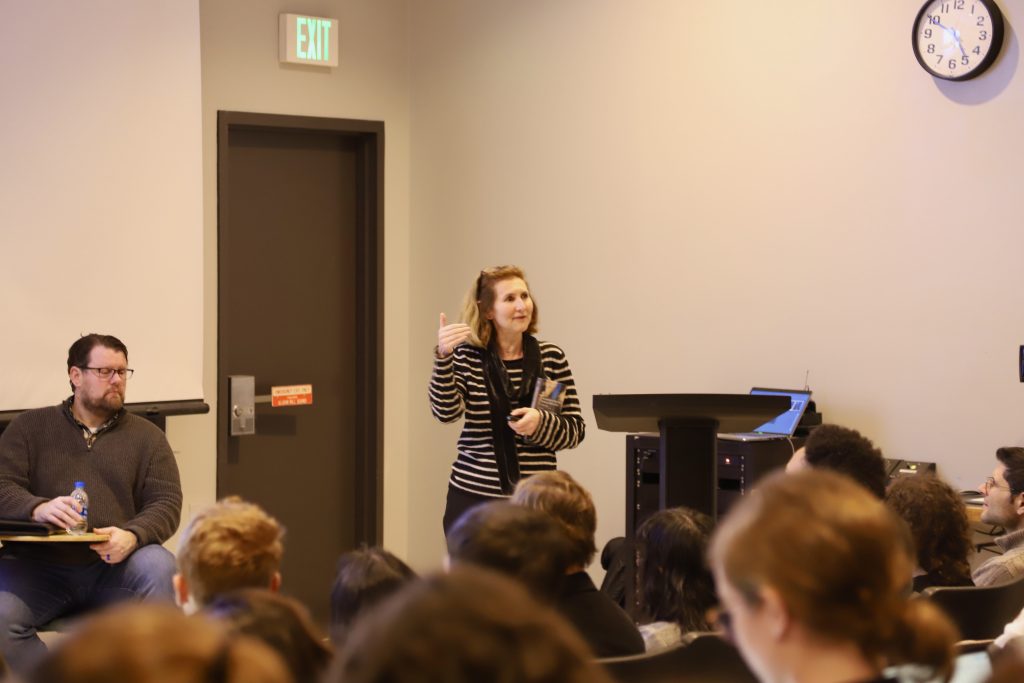The Human Rights Institute (HRI) and the Center for Middle East and North African Studies (CMENAS) at Binghamton University hosted a Guantánamo Bay panel Thursday, highlighting artistic expression as a form of protest inside the notorious prison.
Entitled “Art as Survival and Resistance: Guantánamo in the Global War on Terror,” the event was both a book launch and informational seminar, where speakers discussed the connections between art and power for detained prisoners at the Guantánamo Bay detention camp. The discussion focused on the experience of Moath al-Alwi, a detainee in the facility who uses art as a means of expression.
The panel was spearheaded by Alexandra Moore, a professor of English and the director of the HRI — an organization that facilitates discussion about policy-making regarding global human rights issues. Olivia Vinson ‘23, a master’s student at Columbia University and Joshua Reno, professor and graduate director of anthropology, joined Moore at the event. Kent Schull, an associate professor of history and the director of CMENAS, which focuses on developing research about the Middle East and North Africa, moderated.
“[The event] is based on a book edited by [Moore] and Elizabeth Swanson,” Sule Can, CMENAS’s outreach coordinator, wrote in an email. “The discussion for this panel goes beyond the book and focuses also on the Global War on Terror in the context of [the Middle East and North African] region.”
Panelists began by providing background information on the history of United States presence at Guantánamo Bay and the purpose of the facility post-9/11. The detention facility was used as a holding area for suspected enemies of the United States, where Moore argues the detainees are given “no legal process.” Throughout the presentation, several graphs were shown depicting relevant information about the facility’s numerous human rights violations.
The bulk of the presentation depicted the life of al-Alwi, who has never been charged with a crime and continues to be held at the facility, despite being cleared for release in 2021. Both Moore and Vinson shared the personal impact that creating art had on al-Alwi, despite never being able to meet with him formally. Moore explained how the art program instituted by former President Barack Obama allowed detainees to pursue creative projects.
Vinson explained how the Source Project, a research program providing research opportunities for first-year students, inspired her to continue research into the camp.
“I wasn’t previously interested in Guantánamo before the Source Project,” Vinson said. “But seeing [Moore’s] work made me realize that it was meaningful and something I wanted to continue.”
Throughout the seminar, various pictures of al-Alwi’s creations — three-dimensional boats made of objects, including soap and bottle caps — were shown. The presenters emphasized that many of al-Alwi’s artworks had not been allowed public release by the government, with Moore adding that many of the pictures she had taken were edited or deleted by government officials at the facility before she exited the premises. A primary focus for the book’s editors was to give al-Alwi a voice without speaking to him.
Following Moore and Vinson, Reno explained that al-Alwi’s artwork could be likened to a hunger strike, adding that with al-Alwi’s circumstances, creating art from waste created a power shift similar to other forms of protest. He added that the creations are “extensively empowering.”
Michael Rosca, a freshman majoring in history who attended the event after Can, his professor, promoted it, said he emerged with a greater understanding of the situation in Guantánamo Bay.
“My biggest takeaway was being reminded and more importantly, realizing how powerful the U.S. government is,” Rosca said. ”The United States’ power and influence was seen through the actions and conditions imposed on [al-Alwi] during his imprisonment at Guantánamo Bay.”
Before the event ended, the floor was open for questions. One audience member asked about claims that al-Alwi had been a guard for Al-Qaeda, prompting Moore to respond that the claims were unsubstantiated and that al-Alwi had not been charged with any crimes during his detainment.
“[Guantánamo Bay] is not only geographically far [away],” Reno explained to the crowd, “Legally, it’s on a different plane.”



